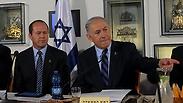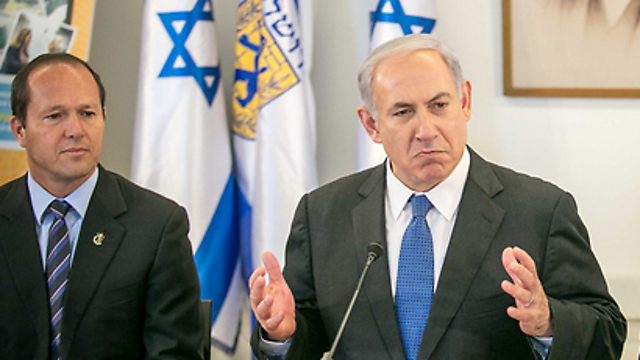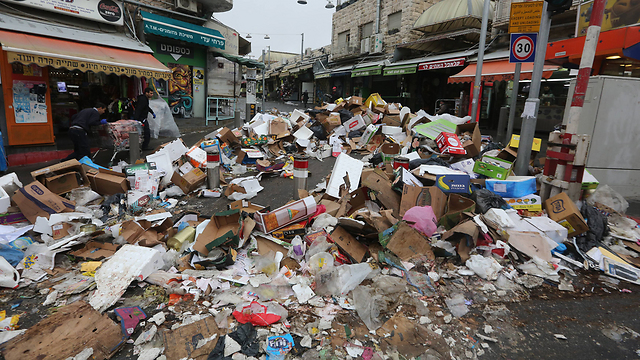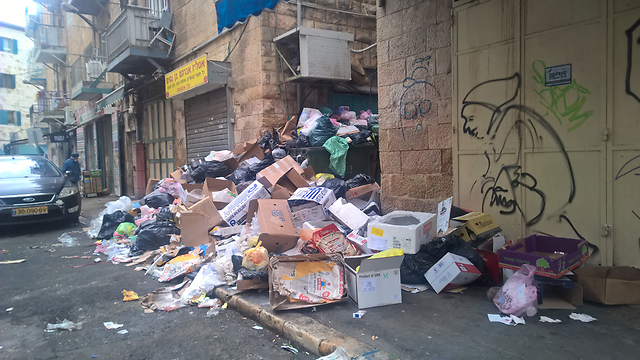

PM intervenes to bring Jerusalem strike to an end
Jerusalem Mayor Nir Barkat concludes city's three-day strike following personal request from Netanyahu; Barkat invited to present Jerusalem's needs before the government, after the Jerusalem Municipality claims the Finance Ministry failed to transfer funds for the city's everyday maintenance.
Prime Minister Benjamin Netanyahu phoned Jerusalem Mayor Nir Barkat on Tuesday, asking that he put an end to the citywide strike that began on Sunday following a dispute with the finance ministry over the delay of a transfer of 800 million shekels earmarked for the city.
He also invited Barkat to a government meeting this coming Sunday, in an effort to find a solution to the capital city's budget. Barkat obliged Netanyahu and spoke with members of his municipal coalition to bring an end to the strike.
In a message issued after his call with Netanyahu, Barkat announced the end to the strike. "I thank the prime minister for taking responsibility and intervening to make sure the residents of Jerusalem get what they deserve," said Barkat.
"There is no other way but success," added Barkat. "I hope that the prime minister's intervening, together with the good intentions of the government and particularly of Finance Minister Moshe Kahlon and his ministry, will lead to the strengthening and fortification of Jerusalem in the future."
He also thanked Minister of Jerusalem Affairs Ze'ev Elkin (Likud) for his assistance in the matter.
The Jerusalem City Council decided on Sunday to increase the intensity of their strike. On Monday, schools were delayed and preschools were closed all across the city. That was in addition to strikes in most city departments and sectors, such as sanitation and water, which were already in progress.
The city council stated that the lack of funding might lead to employment terminations and severely damage the services granted by the city to the public.
As a result of the strike, the Teachers' Union said that the education institutions' dire state in Jerusalem—which included trash littering the schools and a lack of guards, teachers' assistants and secretaries—left no other choice but for teachers to arrive at work but without receiving their students.
Though the municipality had declared a strike in high schools and after-school daycare facilities, a court order prevented the strike by issuing an injunction.
While city-run kindergartens were shut down as part of the strike, the ultra-Orthodox kindergartens, however, continued to be up and running, since they are operated by the Haredi education system.
"It's obvious that Nir Barkat had an interest not to hurt Haredi education. It just goes to show his contempt for the capital's secular public," said sources within the municipality.
In addition to the residents' complaints, the city's trash continued to pile up in the streets, after not being removed since the beginning of the week.
Early on in the strike, the Jerusalem Municipality issued a statement detailing the reasons for the strike. "Due to the Finance Ministry's refusal to assist Jerusalem, the municipality will be forced to make lateral budget cuts that will include firing thousands of city workers, as well as a substantial cut to cultural, sports, welfare and education funding.
"I call on the finance minister to immediately take personal action to address this crisis so we won't have to fire employees and cut funding," added Barkat. "The Finance Ministry's refusal to transfer funds that have already been promised to Jerusalem will severely harm Israel's capital and will be the direct responsibility of the finance minister. The is a real struggle that is shared by all the organizations in Jerusalem."
The Finance Ministry responded to the strike's end by posting a tweet that read "1:0," only to delete it moments later.
In a later post on Facebook, Barkat elaborated on the strike and its conclusion. "I just concluded a meeting with several residents, where I described the difficulty my partners and I faced over the past few days (…) We comprise a broad front, whose goal is the wellbeing of Jerusalem's future. This isn't just about a budget, but about an overall outline that can minimize gaps and provide high-quality services, instead of giving in to calls to cut down and fire people, which were suggested to me."
Barkat explained that he accepted the prime minister's call to end the strike and will present the challenges Jerusalem faces before the government because he believes there is a genuine desire to help. "We're asking the government for some good will to help Jerusalem begin a new course of action." He ended his post by saying that "Hopefully, we will start on a new path."



















